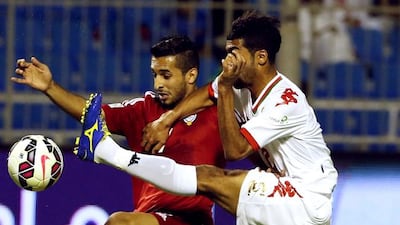a // a
Yet again, the goals have dried up for the UAE.
The 3-2 friendly win over Lebanon a week before the start of the Gulf Cup had raised hopes that the Mahdi Ali’s side were over their mini-slump. The 0-0 with Oman in their tournament opener has seen all the concerns come flooding back.
Where have the goals gone?
It would be too easy to lay the blame on the team’s front three of Ali Mabkhout, Ahmed Khalil and Ismail Al Hammadi, all heroes of last year’s Gulf Cup championship in Bahrain.
On Friday, Al Hammadi was the only UAE forward to cause any sort of goal threat and, even then, mostly from long-range shots.
Two, in particular, forced Ali Al Habsi into excellent saves before the Al Ahli player was substituted in the second half after a head injury.
Mabkhout and Khalil on the other hand looked to be lacking sharpness and confidence as they toiled in vain against a well-organised Omani defence.
On too many occasions one would find himself trapped by at least two opposition players, with the other failing to provide an outlet.
Mahdi Ali’s faith and loyalty in the two is commendable, but it might be time to play one or the other, by starting Ismail Matar or by rejigging his tactics.
The captain’s lack of fitness means he is unlikely to last 90 minutes, but Mahdi Ali could reverse his policy from last year’s Gulf Cup by playing Matar from the start and replacing him after one hour.
But it is simplistic to blame only individual performances. The system does not seem to be working fluidly at the moment.
Perhaps the goals will flow only if Omar Abdulrahman is relieved of some of his defensive duties. Against Oman he was one of the UAE’s hardest-working players, at one point seen dispossessing an opposition player in his own right-back position, before attempting to start yet another attack.
Abdulrahman had a decent match, considering his injury lay-off; he had not started a match since September 30.
Yet, he was dropping so deep to instigate moves that his direct goal threat was eliminated. Some of his cross-field passes – especially a sumptuous one to Mabkhout – remained dangerous, but having him drop back into his own half so often made things easier for Oman.
The result left a huge gap between him and the other midfielders, and the forwards.
Perhaps starting Amer Abdulrahman and Habib Al Fardan as the double defensive pivot can free the Al Ain playmaker to play in his favoured advanced role in a 4-2-3-1 formation.
Mahdi Ali’s belief in his own tactics and players is unlikely to be shaken by the 0-0 draw, but he cannot afford another goalless match against Kuwait.
The longer the drought continues, the more likely he might need to take drastic action.
akhaled@thenational.ae
Follow us on Twitter at SprtNationalUAE

